- Do you want your clothes to be clean, fragrant, and durable without shrinking or fading?
- As a housekeeping manager, do you need to keep linens and fabrics clean and highly durable?
- Or are you anyone wanting your laundry to be clean and to protect the fibers?
To help ensure that clothes and fabrics are washed clean but also durable, you need to pay attention to and correctly implement the factors affecting the washing process. Let’s join Thai Tuan LMS to explore the details in the following article!
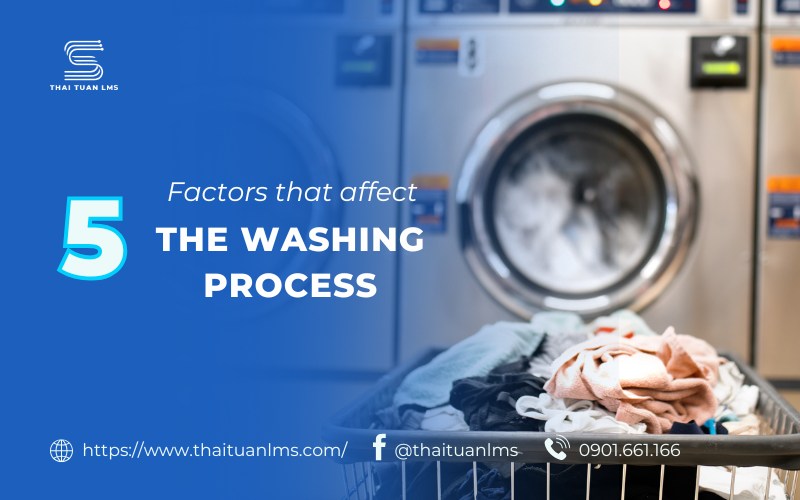
5 Factors Affecting the Washing Process
Mechanical impact, washing time, laundry chemicals, washing temperature, and human effort are among the crucial factors that influence the cleanliness and durability of fabrics and clothes.
Mechanical Impact
Mechanical impact refers to the choice of washing machine and how to use it effectively. Washing machines operate by shaking or rotating components to remove stains. However, this process can also damage fabrics if the spin cycle is too strong for the fabric type.
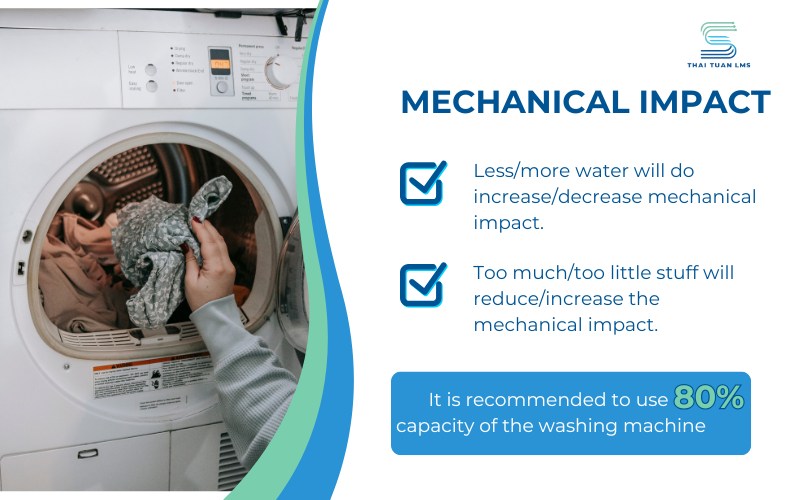
- The amount of water used (whether it’s too little or too much) will increase or decrease the mechanical impact.
- The amount of laundry loaded into the machine (whether it’s too much or too little) will decrease or increase the mechanical impact.
It's best to only use 80% of the washing machine's capacity—not too much and not too little—to achieve optimal mechanical impact to effectively remove stains from fabrics.
Washing Time
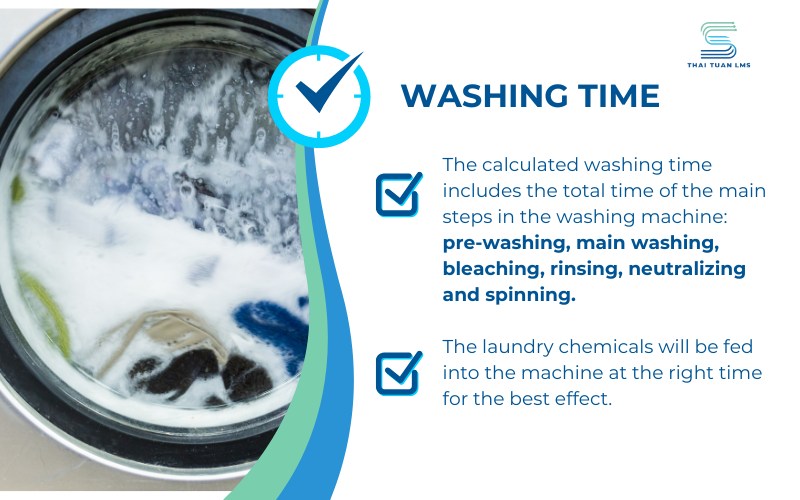
Washing time is also a factor affecting the durability of fabrics. Washing time includes the total duration of the main processes in the washing machine: pre-wash, main wash, bleaching, rinsing, neutralizing, and spinning. Laundry chemicals should be added to the machine at the appropriate time to maximize their effectiveness.
Laundry Chemicals
One of the factors that influence the laundry process is "laundry chemicals." There are many types of laundry detergents, and it is essential to choose products with clear origins to ensure effectiveness.
Each stage in the washing process requires specific chemicals, and the basic laundry chemicals involved include:
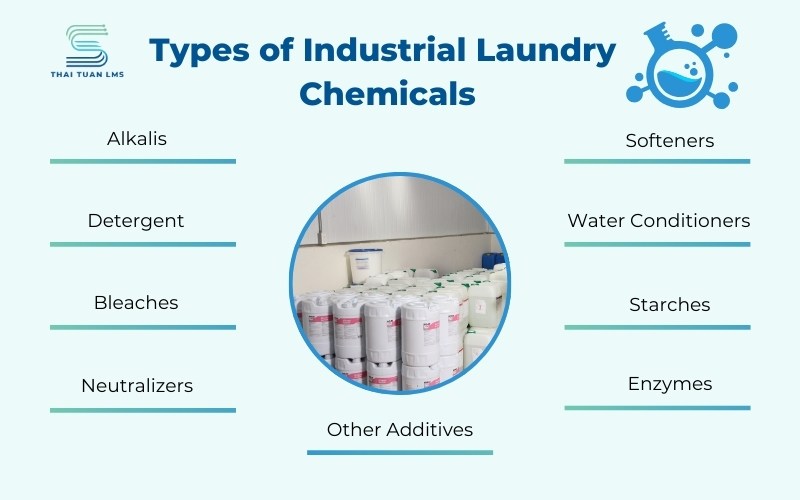
- Alkaline Agents: Help increase alkalinity in the wash program, thus dissolving (softening) stains.
- Main Detergent: Acts directly on stains, removing them from the fabric fibers.
- Bleaching Agents: Remove color from stains, disinfect, and make the fabric appear brighter. The two common types of bleaching agents are oxygen-based and chlorine-based.
- Neutralizing Agents: Help neutralize any residual alkalinity in the fabric. If excess alkalinity remains, it can cause yellowing of the fabric and skin allergies.
- Fabric Softeners: Create a soft feel in the fabric, helping to optimize the lifespan of the fabric fibers.
Washing Temperature
Washing temperature plays a crucial role in ensuring the quality and efficiency of the laundry process. Different fabrics require different washing temperatures. Choosing the appropriate washing temperature not only helps eliminate bacteria and stains but also protects the fabric fibers.
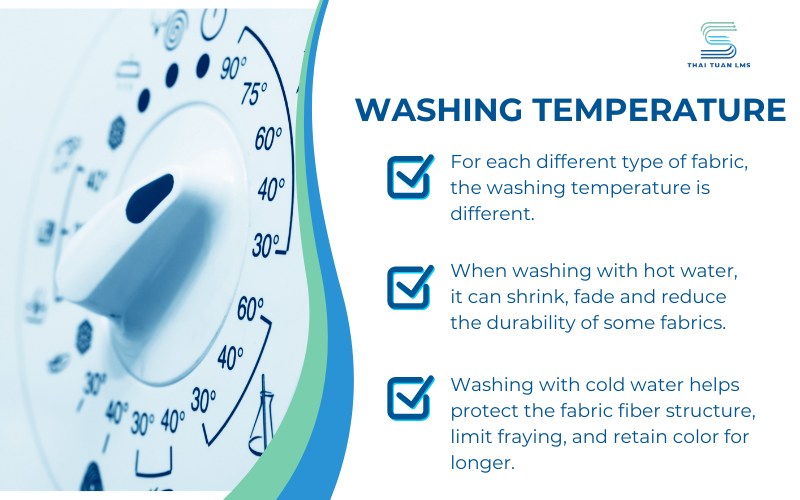
- Water Temperature from 30 - 40 °C: Suitable for delicate fabrics that easily fade, tear, and for woolen items, as it protects the colors and material.
- Temperature from 40 - 60 °C: Effectively cleans while limiting fading and shrinkage, suitable for regular items such as blankets, bed linens, cotton fabrics, and wool (using 40 °C), towels, underwear, and synthetic fibers (using water from 40 - 60 °C); cotton, linen, various types of cotton fabrics, and blended fabrics (using water at 60 °C).
- Temperature from 60 - 90 °C: Appropriate for washing items for infants and young children, challenging-to-fade fabrics, and linen materials (such as bed sheets and tablecloths).
Washing with hot water can cause shrinkage, fading, and reduce the durability of some fabric types. Washing with cold water helps protect the structure of the fabric fibers, limits fraying, and keeps colors longer.
Human Factors
The human element plays a critical role in influencing all other factors that affect the laundry process. People operate and maintain washing machines effectively, ensuring that the washing process maximizes the mechanical effects of the machine.
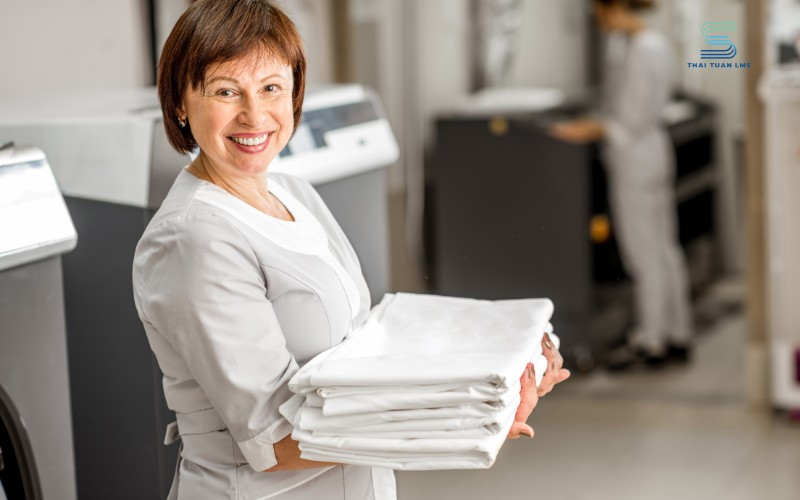
Humans also contribute to researching suitable washing formulas, appropriate washing times, and adjusting water temperatures for different fabric types.
People are the core element of each unit, and it is essential to have knowledge and receive comprehensive training in their expertise.
Thai Tuan LMS - Perfect Laundry Solutions, Top Notch Technology
Thai Tuan LMS is a leading provider of industrial laundry services and digital management solutions for linen management in Vietnam.
At Thai Tuan LMS, we operate the largest laundry facility in Southeast Asia, equipped with modern machinery imported entirely from Germany, enabling us to efficiently remove stains.
- The chemicals we use are Diversey products, which meet international standards.
- We have a dedicated R&D team that researches specific washing formulas for each type of fabric.
- The laundry process at Thai Tuan LMS is a one-way procedure, ensuring safety and preventing cross-contamination. Our highly skilled workforce is well-trained, ensuring that every step of the laundry process is carried out to perfection.
To achieve clean fabrics and garments with high durability, attention must be paid to the factors that affect the washing process. Understanding and being mindful of these factors will help you optimize the laundry process, enhance efficiency, and save costs, while also contributing to environmental protection.

 Vietnamese
Vietnamese  English
English 










